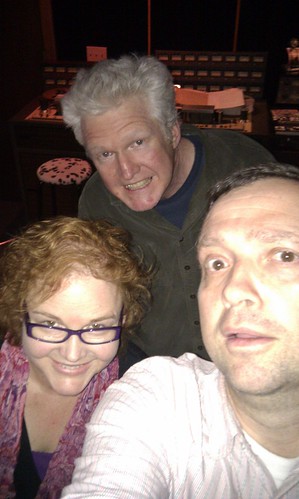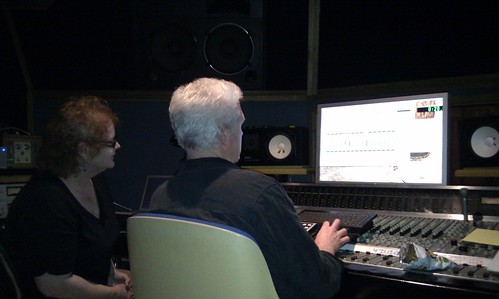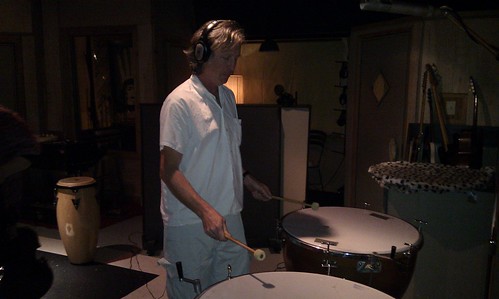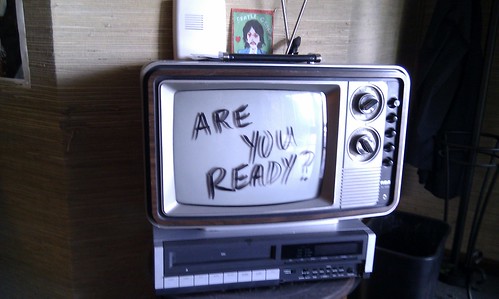Tonight I'm missing a show at the Levitt Shell in Overton Park, Memphis, originally scheduled as a Big Star performance, but now re-purposed as a tribute to Alex Chilton. Of course I'm missing it, because I live 4,400 miles out of town, just beyond the dying gasp of Memphis' relentless eastward urban sprawl. Last night, I missed what by all accounts was a great show by my friend and occasional co-conspirator, Linda Heck, with whom I have just recently done some recording, both from London and in Memphis. This remarkable video sort of connects the two, at least in my mind.
Here we see Alex, joined by the late Jim Dickinson and Lee Baker, along with Sid Selvidge, Marcia Hare, a bass player I don't recognize, and an unseen drummer (presumably Richard Rosebrough) recording sections for "Like Flies on Sherbert," in either 1978 or 1979. This was a record I listened to with fascination for a long time, and while reviewers at the time struggled to know what to make of it, in retrospect, I think it's an important missing link on the road to the "lo-fi devolution." It's also an awful lot of fun.
If I understand it correctly, the story is that Alex managed to con some free studio time by claiming that technical problems had impeded his production of the Cramps' "Songs the Lord Taught Us," though this may be apocryphal.
This is a fascinating document to me, both of the people and of the recording process at the time. My recent Urashima Taro-like re-entry to the recording studio was an eye-opener, and this video reminds us how painful and challenging the process used to be. Witness Sid Selvidge trying with great difficulty to punch a single phrase into the beginning of "No More the Moon Shines on Lorena," and you get a sense of how difficult things were. Obviously, working within these constraints also prompted more innovative thinking, but damn, some easy things really seem unnecessarily hard in retrospective.
The songs are, "My Rival," "No More the Moon Shines on Lorena," and "Boogie Shoes." A longer version of this once existed on Vimeo, which also included more of "My Rival," "Bangkok," "Baby Doll," and "Rock Hard." Chaotic and all over too soon. Rest in peace, Alex.
Saturday, 15 May 2010
Electricity
I think it's a safe bet that the Cannes Film Festival will not see the likes of this this year, or any other, for that matter.
Wednesday, 12 May 2010
Sunday, 2 May 2010
What turns you on, U.F.O.?
Doug Easley's studio office contains a huge number of song lyrics from songwriter hopefuls who sent them in to the previous occupant/proprietor back in the 1970s. The most outstanding and strange that I saw was called "What Turns You On, U.F.O.?" It was an expression of exasperation with a lover, apparently of a sexual nature, but only the author knows for sure. Hopefully she since has either worked it out or moved on. No real connection with this short video of the Joe's Liquors "Sputnik" sign, apart from my own oblique connection. I always loved this Memphis landmark when I lived there, but like so many things in the city, it was frozen and non-functional at the time, only coming to life after I had moved on.
I'll remember April

The burst of beautiful spring weather we've had recently has evaporated, and I find myself looking out my window on a grey and unseasonably cold London Sunday afternoon, struggling to grasp that the events of the past week were real, not imagined.
I returned Thursday morning from a four-day lightning trip to Memphis, having at last escaped the clutches of Eyjafjallajokull. There I had the indescribable delight of three days in the studio with Linda Heck and the ever-amazing Doug Easley.

I shot plenty of video on my Flip Mino, but sadly this precious device seems to have died somewhere along the way, and I can't even retrieve the videos. I do have this one short segment shot on my phone, wherein we're listening as our old band mate Kurt Ruleman adds some percussion parts to a track.
The main focus of these sessions was vocals: Linda re-cut a couple of main vocals, and I added my voice to ten tracks, on some of which Linda sang with me. We have always had a deep unspoken musical understanding, and I find that harmony ideas flow thick and fast in my mind when I hear her sing. We also have a tendency to sound alike, or more accurately, I have a tendency to sound like her when I sing with her. I am curious to see if, when this collection of songs sees the light of day, listeners will even realize it's not all her.

We also synched up the guitar parts I recorded for four songs in London, so she and Doug could hear properly for the first time what we did (as opposed to the mp3 versions I sent previously, which have a Phil Spector-esque quality to them - as in it is often hard to unpick sounds). Kurt came in to do some percussion, including playing Doug's tympanis, which used to belong to Stax.

There were some more details added here and there: Linda played some sparse pedal steel parts on "Transformed," to which I also added pedal steel (though in my case it is strummed slowly, to sound like a tanbura); Doug added some beautiful pedal steel and virtual vibes to "At Your Door"; and in the absence of our friend John McClure I punched in a sparse bass line during the breaks in the same song.
So, at this point, I'm guessing this project may be near completion, apart from the mixing, not quite two months since it was begun. Linda, John and Kurt cut 15 basic tracks and vocals at the beginning of March, I did my basement sessions later the same month, Greg Easterly and Mark Harrison added strings, sparse guitar and synth to a couple of songs in Nashville in April, and this string of vocal/percussion/overdubs sessions in Memphis takes things to a pretty complete level, at least as far as I can hear.
I am as excited about this as anything I've ever been involved with, and I love every second of the 51 minutes or so which these songs comprise. I think Linda's writing and singing is in top form, and the playing from her and Messrs. McClure/Ruleman/Spake/Duckworth/Easley/Easterly/Harrison is tasteful and fine throughout. For my own part, having put the guitar down for 15 years, I feel like I play better than I ever did when I was trying consistently. Perhaps I should not play more often.
Seriously though, it's interesting to have the perspective of time to put things into context. I used to find it daunting to go into the studio in isolation to do guitar or vocal parts, and was prone to clowning in order to hide my discomfort or lack of self-confidence. I also recall many times being in the studio with no clear idea of what we were trying to achieve - this sometimes gave rise to interesting accidents, but more often led to indifferent results.
The contrast with the past could not be greater in this project, at least as I have experienced it. For once, I have felt a sense of lucidity and calm throughout, in having ideas worked out in advance which ended up being executed as planned or improved through collaboration with others. I guess this is the much-vaunted "confidence and ease that comes with age and experience," and I can only hope it eventually permeates all other aspects of my life.
The material in question also makes a good contrast with the much-lamented "Lost Album." Whereas we either ran out of money or patience, or perhaps both, before that body of songs could be satisfactorily mixed and presented as a finished, polished product, every song here already feels like a complete, self-contained work. Every song here, bar one, has a definite ending, rather than a lazy fade. The arrangements are more sophisticated and there is much more going on sonically, but the sound is much sparser - another lesson of experience being a greater capacity to listen and self-edit. Saying nothing, or little, usually carries more weight and meaning than a filibuster.
And the nature of the songs in this set is also a long way from 1992. What are the songs about? One thing I have realized after all these years is that Linda's writing process is probably a much more complex affair than might seem apparent to anyone but her, which makes interpretation a fairly treacherous task. There are some non-obvious shifts in point-of-view which I am now aware of, and in one case I assumed a song to be about a very specific individual, only to be told that the lyrics had the widest and most general application imaginable. So, in short, it's not for me to try to interpret or explain, because I may be wrong, apart from the songs I have asked about and had explained to me. However, I do hear some common themes cutting across most of the songs involved here: emotional estrangement (both from the other and the self), death (in a variety of senses/guises), vulnerability, acceptance, forgiveness, self-discovery, rebirth. Grown-up stuff, but beautiful and a lot of fun. I am ecstatic and thankful that I got the chance to be a part of it.

Subscribe to:
Comments (Atom)


